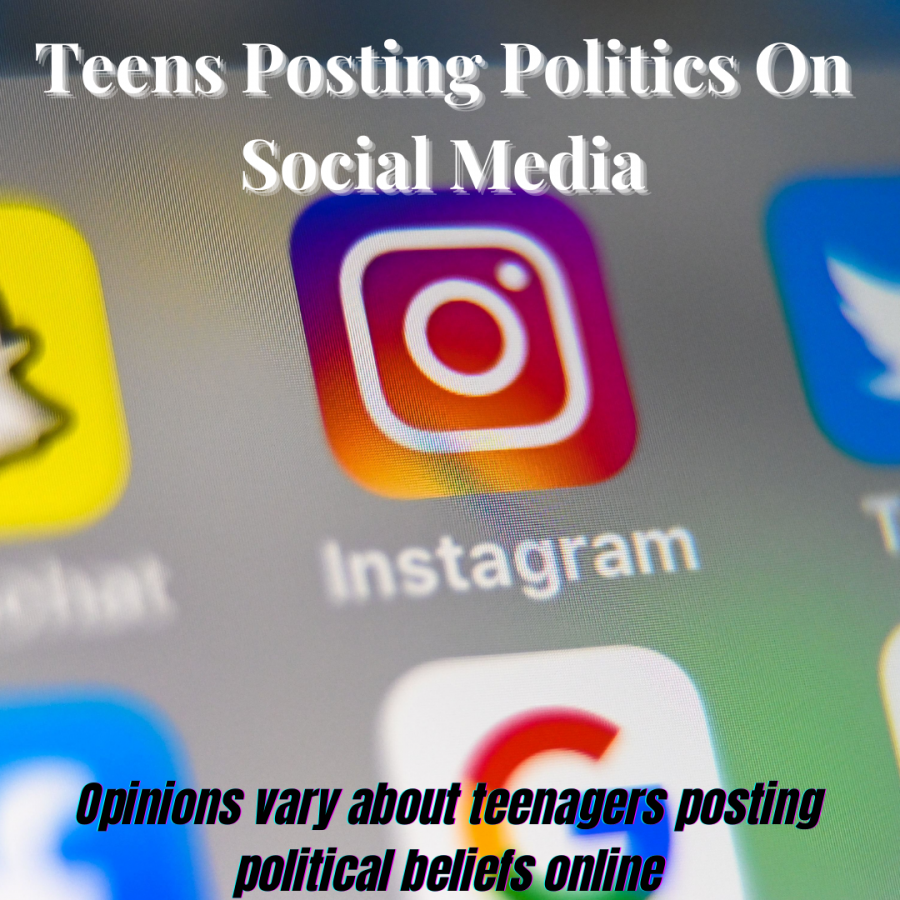Teenagers political impact on social media
November 3, 2021
When they were first created, social media platforms were meant for entertainment, not really places to have politics be seen on, but today, the majority of people on social media post their political beliefs and opinions on their account or story. Many people wonder if social media is the right place for teenagers to express their political views.
The teen’s post’s liability source is based on where they get the information from, not just finding something and posting about it without enough knowledge about the topic. Erin Seitz, the World History and Sociology teacher, emphasizes the importance of today’s society and the need for teens to share their opinions.
“Teens naturally want people to know what they are thinking in this day and age due to constantly being surrounded by social media. I think what’s important is that teens know what sources are to be considered reliable as well as not using a source just because it already backs up your opinions,” said Seitz.
Sophomore Ava Rann agrees with Seitz’s belief of the importance of the teens’ opinions’ sources. Some kids that are younger may only take the political statements said by the parents and post about it, even though they may not understand what it means yet. Rann and Seitz agree that it’s important where the evidence of the post comes from.
“Something else that I am sort of against is like when younger teenagers or kids post about politics. I don’t like it because the young teens are more than likely biased because they’re so young, they probably still believe in their parents’ opinions, since they are too young to really understand the political issues happening today,” Rann said.
Rann isn’t the only student who has strong opinions about politics. Although Rann isn’t the only teen with beliefs, the other person here has a whole other point of view.
Sophomore Lacey Vaughn posts politics on social media and says that posting political opinions on popular social media apps can help spread the word of political events in action to others who don’t really know what’s happening.
“I post my political beliefs mostly on Instagram or Snapchat or just like a get together where people will see or hear about what I’m trying to say, because I try to spread the word to people who just don’t really know anything about important political facts, so if they learn about it on social media, maybe they can do something about the problem just like I am.” Vaughn said.
According to Vaughn, some people who view the posts can help a little bit or perhaps not at all, since they’re only teenagers, but by reposting and having others listen and understand, it might make a small difference.
“Teenagers posting about politics on social media doesn’t really bother me, because it’s not really like they can do anything about it and make a huge difference, since they’re not even eighteen. Maybe sometimes they can make a small difference by spreading the knowledge to other people by reposting,” Rann said.
On this topic, trying to make a difference isn’t the only problem in the situation. There is a difference between a kid reposting a political post that understands the problem, and a kid reposting that does not understand.
“I think if people can take on a more understanding role when listening instead of trying to change people’s minds all the time, it could lead to more productive conversations.” Seitz said.
Seitz justifies her opinion that if the viewer or listener would listen and elaborate in their mind of what the political person says, it could end better, and future political conversations can be more beneficial and reflect in their mind on what the politician says.
“There are some things that I understand people feel very strongly about, but our first goal should definitely be understanding where someone is coming from if it’s being posted on social media,” Seitz said.
Seitz points out that a lot of people could feel strongly about their political beliefs, but those strong feelings could be coming from many different directions, and the viewers of the post need to try to understand where the person’s thoughts are coming from.
“Even though I think social media is a good place to post, some people go against me, like sometimes they’ll make a really racist joke or say something negative about sexualities.” Vaughn said.
Vaughn thinks that social media is a good place to speak about politics, but there are always people out there who think serious topics can turn into jokes because they don’t understand the seriousness of the subject, and the jokes they make are actually either slurs and or or mean comments that some people find offensive.
“It’s really sad because it’s not funny and I try to make that clear when I post on Instagram. Not everybody has to agree with me, but just don’t make jokes about serious things.” Vaughn said.
While some of the people say bad things about the topics to the person who posted them, Vaughn says that she and some other people find it wrong for those people to say rude things, so they try to make it crystal clear that the people don’t have to agree with the posted topic, but they don’t want the mean and inappropriate comments on their story.
“There are a lot of cons about posting on social media about politics but there are pros too, often they’re emotionally and mentally beneficial.” Vaughn said.
Vaughn says that it’s hard to argue with people that fight her about her beliefs that she posts, and even though there are many cons that come with posting politics, there are pros as well. Although there are multiple benefits, the most important, according to Vaughn, is the good feeling of knowing that she is doing something to help society, and helps her mentally and emotionally.
“I think there is some good stuff and bad stuff posted on social media. Like some good stuff is when people agree and try to help with the political issue happening. But some bad stuff is when people disagree with the posted thing. Like, I dislike seeing the bad presidential posts, but I don’t say anything, but some other people do,” Rann said.
There are certainly some good and bad things about posting sensitive topics. The reactions on the posts depend on the viewer. A person could have a positive reaction, or an out-of-hand negative reaction.
Social media can be a good place to post about politics or it can be a bad place to post politics. It is based on the person’s opinion if it’s a better choice to post their political beliefs, or if they should not.




